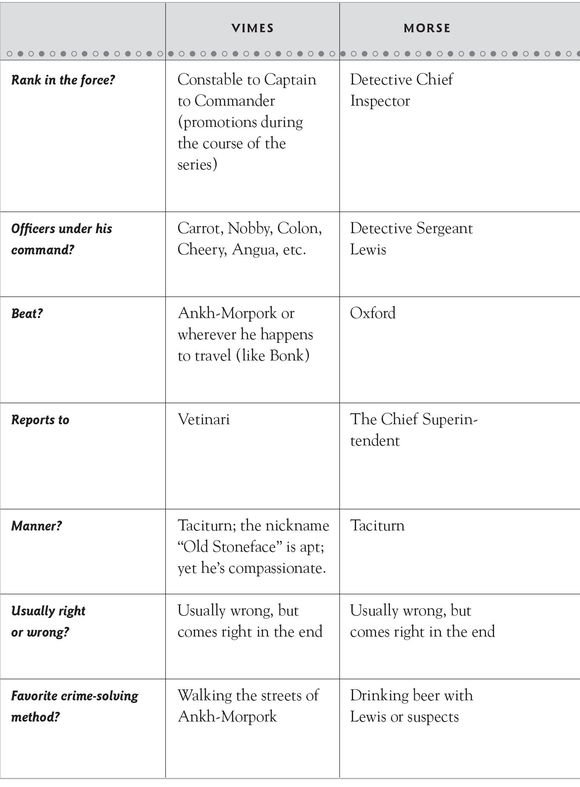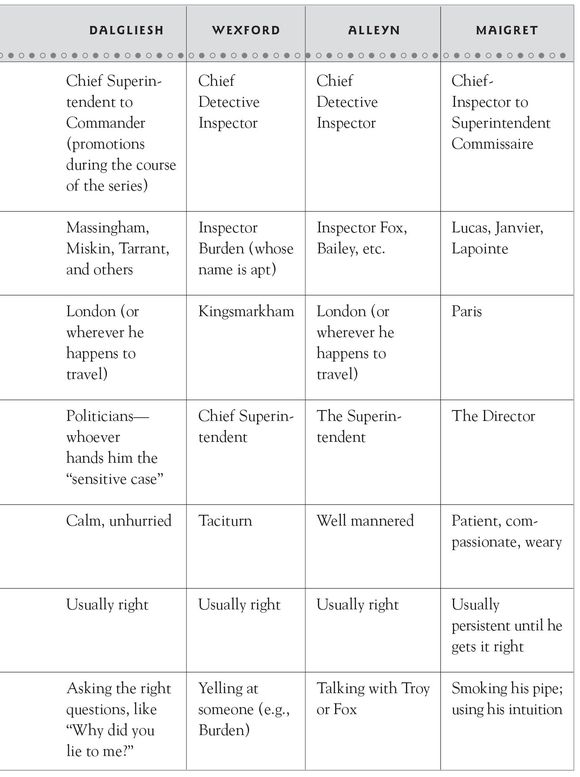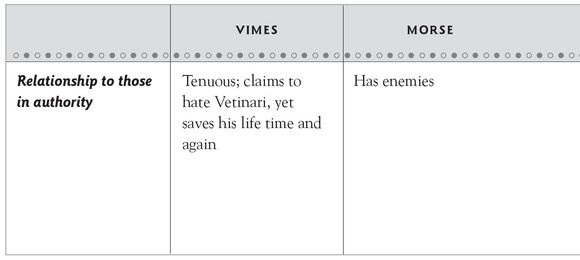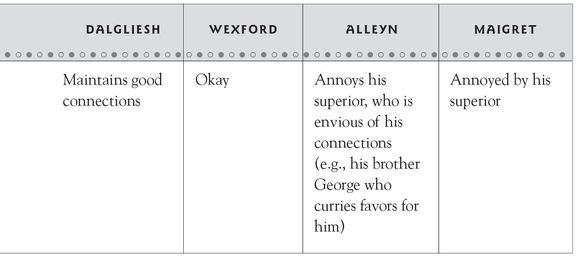Secrets of the Wee Free Men and Discworld (5 page)
Read Secrets of the Wee Free Men and Discworld Online
Authors: Linda Washington

BOOK: Secrets of the Wee Free Men and Discworld
13.36Mb size Format: txt, pdf, ePub
Police Procedurals: Murder by the Book
Us:
With ex-magistrate/employees of the British Home Office (P. D. James), you would expect accurate details about police procedures. But what of Pratchett?
With ex-magistrate/employees of the British Home Office (P. D. James), you would expect accurate details about police procedures. But what of Pratchett?




You:
Yeah, what of him?
Yeah, what of him?
Us:
Thanks to his journalism background, you get the feel of the mean streets, even if they're fictional. Here's how Pratchett's copper compares to the others. (
Go back and read the table
⦠until you're back here.)
Thanks to his journalism background, you get the feel of the mean streets, even if they're fictional. Here's how Pratchett's copper compares to the others. (
Go back and read the table
⦠until you're back here.)
Â
Harrowing Horror and Subtle Suspense
Us:
Every good suspense story needs a page-turning plot to keep you on the edge of your seat. Although he does not churn out suspense novels in the purest sense of the genre, Pratchett ratchets up the suspense quotient in most of the books about the Watch. His books might aptly be called horror suspense
Buffy the Vampire Slayer/ Exorcist/Underworld
style. After all, Vimes has stared down dragons (
Guards! Guards!
), negotiated with golems (
Feet of Clay
), wrestled and escaped from murderous werewolves (
The Fifth Elephant
) and a venomous vampire (
Feet of Clay
), and been influenced by evil entities such as the Summoning Dark (
Thud!
) and the gonne, a whispering weapon invented by Leonard of Quirm (
Men at Arms
) which destroyed the life of assassin Edward d'Eath.
Every good suspense story needs a page-turning plot to keep you on the edge of your seat. Although he does not churn out suspense novels in the purest sense of the genre, Pratchett ratchets up the suspense quotient in most of the books about the Watch. His books might aptly be called horror suspense
Buffy the Vampire Slayer/ Exorcist/Underworld
style. After all, Vimes has stared down dragons (
Guards! Guards!
), negotiated with golems (
Feet of Clay
), wrestled and escaped from murderous werewolves (
The Fifth Elephant
) and a venomous vampire (
Feet of Clay
), and been influenced by evil entities such as the Summoning Dark (
Thud!
) and the gonne, a whispering weapon invented by Leonard of Quirm (
Men at Arms
) which destroyed the life of assassin Edward d'Eath.
Vimes has fallen out of windows, down mineshafts and waterfalls, and escaped by the skin of his teeth, all for the sake of keeping our pulse rates up and our lights burning far into the night as we follow his exploits and those of the officers under his commandâthe always unsettling Angua, the courageous Captain Carrot, and “dumb and dumber” Colon and Nobby.
You:
They're more Laurel and Hardy-esque.
They're more Laurel and Hardy-esque.
Â
The Thrill of the Chase
Us:
If you haven't read much of the Discworld seriesâ
If you haven't read much of the Discworld seriesâ
You:
I've read most of them.
I've read most of them.
Us
(
again as if you had not spoken
)
:
âyou might envision Ankh-Morpork's quaint cobblestone streets, clacks towers, and stagecoaches as a low-tech world far different from that of
The Hunt for Red October
and other Tom Clancy creations. But for a plot that combines technology Pratchett-style (which Vimes refers to as “technomancy”; for more about that, read
chapter 19
) and political shenanigansâthe kind a writer like Clancy or Frederick Forsyth would discussâlook no further than
Jingo.
It has a
Day of the Jackal
-meets-
Hunt for Red October
element with a side order of
JFK
and
Lawrence of Arabia.
The technology kicks in with the introduction of various Burleigh and
Stronginthearm's weaponry (the Shureshotte Five and the ominous-sounding Streetsweeper) and Leonard of Quirm's Going-Under-the-Water-Safely-Device, a.k.a. the Boat, which is really a submarine.
(
again as if you had not spoken
)
:
âyou might envision Ankh-Morpork's quaint cobblestone streets, clacks towers, and stagecoaches as a low-tech world far different from that of
The Hunt for Red October
and other Tom Clancy creations. But for a plot that combines technology Pratchett-style (which Vimes refers to as “technomancy”; for more about that, read
chapter 19
) and political shenanigansâthe kind a writer like Clancy or Frederick Forsyth would discussâlook no further than
Jingo.
It has a
Day of the Jackal
-meets-
Hunt for Red October
element with a side order of
JFK
and
Lawrence of Arabia.
The technology kicks in with the introduction of various Burleigh and
Stronginthearm's weaponry (the Shureshotte Five and the ominous-sounding Streetsweeper) and Leonard of Quirm's Going-Under-the-Water-Safely-Device, a.k.a. the Boat, which is really a submarine.
The thrill and danger of the chase is the focus of
The Fifth Elephant
, when Vimes runs for his life from werewolves playing “the game,” and of
Night Watch,
when Vimes chases Carcer, a psychopathic killer, through time.
The Fifth Elephant
, when Vimes runs for his life from werewolves playing “the game,” and of
Night Watch,
when Vimes chases Carcer, a psychopathic killer, through time.
Â
Act II, Scene II:
The U(nu)sual Suspects
The U(nu)sual Suspects
“If the point of your story is âwhodunit,' the culprit needs to be worth the finding. Often the nature of the villain, and how absorbing a character he or she is, will affect the flavor of the whole rest of the story.”
44
44
Â
You:
Where'd that come from?
Where'd that come from?
Us:
You'll have to check the footnote. A good mystery needs a worthy adversary who makes the detective earn his or her pay. Sherlock Holmes has criminal genius Professor Moriarty (
The Final Problem, The Valley of Fear
), Jack Stapleton (
The Hound of the Baskervilles
), Irene Adler Norton (“A Scandal in Bohemia”), and others. Sam Spade and Philip Marlowe have various double-crossing clients. Poirot has a slew of murderers and thieves foolish or egotistical enough to match wits with him.
You'll have to check the footnote. A good mystery needs a worthy adversary who makes the detective earn his or her pay. Sherlock Holmes has criminal genius Professor Moriarty (
The Final Problem, The Valley of Fear
), Jack Stapleton (
The Hound of the Baskervilles
), Irene Adler Norton (“A Scandal in Bohemia”), and others. Sam Spade and Philip Marlowe have various double-crossing clients. Poirot has a slew of murderers and thieves foolish or egotistical enough to match wits with him.
You:
A
slew
of murderers? Is that a collective term like a muster of peacocks or a murder of ravens? A murder of murderers perhaps?
A
slew
of murderers? Is that a collective term like a muster of peacocks or a murder of ravens? A murder of murderers perhaps?
Us
(
hastily
)
:
But what of Vimes?
(
hastily
)
:
But what of Vimes?
You:
My cue to say, “Yeah, what of Vimes”?
My cue to say, “Yeah, what of Vimes”?
Us:
In a Pratchett-created world populated by werewolves, dragons, vampires, assassins, golems, dwarfs, and trolls, the sky's the limit for unusual suspects.
In a Pratchett-created world populated by werewolves, dragons, vampires, assassins, golems, dwarfs, and trolls, the sky's the limit for unusual suspects.
Pratchett is adept at juxtaposing unusual villains with the evils of the everyday. (For more on villains, see
chapter 12
.) Vimes's prime adversary is himself, followed a close second by the “politicians”âguild leaders and Vetinari, who is incredibly skilled at mind games. And then there's everyone and everything else: corrupt cops and a psychopath (
Night Watch
); dwarfs, werewolves, and vampires with political agendas (
The Fifth Elephant
); corrupt civil servants and a confused but dangerous dragon (
Guards! Guards!
); assassins with diabolical weapons (
Men at Arms
); a crazed golem and a vampire with an agenda (
Feet of Clay
); the corrupting evils of war and bureaucracy (
Jingo
and
Thud!
); and ancient supernatural evil (
Thud!
). Even a street-smart detective like Sam Spade or a cop like J. P. Beaumont would be hard-pressed to last in the minefield of Ankh-Morpork.
chapter 12
.) Vimes's prime adversary is himself, followed a close second by the “politicians”âguild leaders and Vetinari, who is incredibly skilled at mind games. And then there's everyone and everything else: corrupt cops and a psychopath (
Night Watch
); dwarfs, werewolves, and vampires with political agendas (
The Fifth Elephant
); corrupt civil servants and a confused but dangerous dragon (
Guards! Guards!
); assassins with diabolical weapons (
Men at Arms
); a crazed golem and a vampire with an agenda (
Feet of Clay
); the corrupting evils of war and bureaucracy (
Jingo
and
Thud!
); and ancient supernatural evil (
Thud!
). Even a street-smart detective like Sam Spade or a cop like J. P. Beaumont would be hard-pressed to last in the minefield of Ankh-Morpork.
You:
Not sure I agree with that. If they were born in Ankh-Morporkâ
Not sure I agree with that. If they were born in Ankh-Morporkâ
Us:
Now let's move on to the end.
Now let's move on to the end.
You:
Finally! (
pauses
) You get it? Finally â¦
Finally! (
pauses
) You get it? Finally â¦
Act III:
The DenouementâAll's Well
That Ends Well?
The DenouementâAll's Well
That Ends Well?
Us:
Every good mystery needs a satisfactory ending.
Every good mystery needs a satisfactory ending.
You:
That goes without saying ⦠. Speaking of endings, I never finished what I started to say about Ankh-Morpork at the end of the last scene.
That goes without saying ⦠. Speaking of endings, I never finished what I started to say about Ankh-Morpork at the end of the last scene.
Us:
In some mysteries, a dramatic showdown occurs between the villain and the hero/heroine. In others, the truth is revealed in a dramatic fashion by the detective. (“At eight o'clock precisely in the drawing room, I will reveal the murderer's identity.”) In Pratchett's mysteries, you may find your views overturned as to who the villain really is. Is Dee, the ideas taster of the Low King, really all “he” says “he” is in
The Fifth Elephant
? Is a golem a tool or a person (
Feet of Clay
)? If it is a tool, can it commit murder?
In some mysteries, a dramatic showdown occurs between the villain and the hero/heroine. In others, the truth is revealed in a dramatic fashion by the detective. (“At eight o'clock precisely in the drawing room, I will reveal the murderer's identity.”) In Pratchett's mysteries, you may find your views overturned as to who the villain really is. Is Dee, the ideas taster of the Low King, really all “he” says “he” is in
The Fifth Elephant
? Is a golem a tool or a person (
Feet of Clay
)? If it is a tool, can it commit murder?
You:
I wouldn't mind having a golem to be my slave.
I wouldn't mind having a golem to be my slave.
Us
(
nod, but move on quickly
)
:
Sometimes, although a mystery is solved, some things, like bureaucracy, still continue, to Vimes's chagrin.
(
nod, but move on quickly
)
:
Sometimes, although a mystery is solved, some things, like bureaucracy, still continue, to Vimes's chagrin.
Not content to bring their mystery story to a satisfactory conclusion, some writers attempt to end their creations, and thus begin a new chapter of their literary lives. Arthur Conan Doyle tried to end his famous character by sending him over the Reichenbach Falls with Moriarty. Simenon, too, tried to end the celebrated Maigret.
Pratchett thought he was done with Vimes after
Guards! Guards!
But the fans responded positively. Now Vimes is a favorite of Pratchett's, as he revealed at a book signing in Naperville, Illinois. He's a favorite with us, too, obviously.
Guards! Guards!
But the fans responded positively. Now Vimes is a favorite of Pratchett's, as he revealed at a book signing in Naperville, Illinois. He's a favorite with us, too, obviously.
That's our argument for why Vimes is the hardest-working detective in mystery fiction. Any questions?
You:
I'm sure you'll think of some that I would have asked.
I'm sure you'll think of some that I would have asked.
Mystery Scorecard
C
onfused about which mystery writer is responsible for which character? This handy list will help. For more on Vimes and the
onfused about which mystery writer is responsible for which character? This handy list will help. For more on Vimes and the
| AUTHOR | DETECTIVE/CRIME SOLVER |
|---|---|
| Bain, Donald, and Jessica Fletcher | Jessica Fletcher |
| Block, Lawrence | Matthew Scudder |
| Braun, Lilian Jackson | Jim Qwilleran/Koko/Yum Yum |
| Chandler, Raymond | Philip Marlowe |
| Christie, Agatha | Jane Marple, Hercule Poirot, Tommy and Tuppence Beresford |
| Cornwell, Patricia | Kay Scarpetta |
| Dexter, Colin | Endeavour Morse |
| Doyle, Arthur Conan | Sherlock Holmes |
| Evanovich, Janet | Stephanie Plum |
| Grafton, Sue | Kinsey Millhone |
| Hammett, Dashiell | Sam Spade, the Continental Op, |
| Nick and Nora Charles | |
| James, P. D. | Adam Dalgliesh |
| Jance, J. A. | J. P. (Beau) Beaumont |
| Marsh, Ngaio | Roderick Alleyn |
| Parker, Robert | Spenser |
| Peters, Ellis | Brother Cadfael |
| Pratchett, Terry | Sam Vimes |
| Rendell, Ruth | Reginald Wexford |
| Sayers, Dorothy | Lord Peter Wimsey |
| Simenon, Georges | Inspector Maigret |
Other books
The Howard Hughes Affair: A Toby Peters Mystery (Book Four) by Stuart M. Kaminsky
Un.Requited (Claimed Series) by Morgan, Reese
Theirs Not To Reason Why: A Soldier's Duty by Johnson, Jean
Rage by Jerry Langton
Spellbreaker by Blake Charlton
Acts of Violence by Ross Harrison
Also Known as Rowan Pohi by Ralph Fletcher
Corruption of Blood by Robert Tanenbaum
Heart So Sweet: Book 3 in the Great Plains Romance Series by Corrissa James
The Puttermesser Papers by Cynthia Ozick
